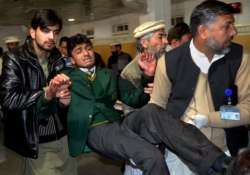India, Pakistan students exchanged letters after Peshawar attack
New Delhi: Hundreds of schoolchildren from India and Pakistan exchanged letters and postcards of solidarity in the aftermath of the terror attack on a Peshawar school last year that shocked people everywhere. “'Papa se kehna

New Delhi: Hundreds of schoolchildren from India and Pakistan exchanged letters and postcards of solidarity in the aftermath of the terror attack on a Peshawar school last year that shocked people everywhere. “'Papa se kehna ab mujhe school lene na aayen, Dekh nahin paoonga unhe mera janaza uthate' (Don't tell papa to pick me up from school; I won't be able to see him lift my coffin),” lamented one of the postcards from Pakistan. Responding to the message of grief from across the border, an Indian student wrote back, “I felt very sad after hearing about the incident. We Indians are always with you. I being a child know how important I am to my parents. Miss you friends.”
Such poignant correspondences between children of the two countries were exchanged in the aftermath of the brutal terror attack at an Army-run school in Peshawar on December 16 of last year, which left over 120 children dead. The exchange of letters and postcards was undertaken as part of a student exchange programme jointly organised by Indian NGO Route2Roots and Citizens Archive of Pakistan (CAP), under which 30 students from 15 schools in Pakistan are currently visiting India.
“The students from both sides were selected on the basis of a 15-month correspondence exercise. While that selection process was going on, the attack in Peshawar took place. And students from both sides continued to write to comfort and solace each other,” Route2Roots co-founder Tina Vachani told PTI.
“While out of hundreds of candidates, we finally selected only a few, the letters, postcards and collages they made, we collected them all as part of the programme ‘Exchange for Change',” she said.
Some of these were displayed at a recently-held exhibition at the Pakistan embassy here, where the visiting students were hosted by High Commissioner Abdul Basit. “Maa kaash mein aj school na jaata, shayyad tumhe phir se dekh pata (Mother, I wish I had not gone to school today, maybe then I would have seen you again)... They can kill us, but they can never end us,” a collage made out of the postcards said.
Class 9 student Shaharyar Tabbassum, part of the visiting students drawn from schools in the Pakistani cities of Lahore, Karachi, Rawalpindi and Islamabad, says he was terrified when the attack took place, but had found strength in the letters and postcards.
“'Allah unko jannat naseeb karaye' (May God grant them a place in heaven),” said Tabbassum, who lives in Islamabad. The Indian students drawn from schools in Delhi, Mumbai, Dehradun, among others, had visited Pakistan last month. Among the Indian students visiting Pakistan was Adeeba Mustafa, of Dev Samaj School in Delhi, who said she wanted to go there “despite knowing about the attack”. Adeeba said that with the school attack in the background, some of the students and teachers began getting cold feet about going to Pakistan with one school even backing out of the programme.
Dev Samaj teacher Richa Sharma, who said she had initially had doubts herself about going to Pakistan, later came back with memories to cherish.
“People used to scare me that you are going to Pakistan. That later you will not get US visa. I got so much love there, now I only want Pakistan visa,” she said. Adeeba and Sharma also met the Pakistani students at the High Commission where they shared their experiences as part of the programme.
The visiting students, who end their week-long trip today, were taken to Taj Mahal and Jantar Mantar, among other places. They also enjoyed the culinary delights of Old Delhi. “We were taken to Karim's near Jama Masjid. It reminded me of my country. We had ‘nahri' there and the Jama Masjid looked so much like the Badshahi Mosque in Lahore. I always wanted to see the architecture here and experience the culture, and now I felt so friendly, I don't want to go back,” Tabbassum said.
The Indian students during their trip were taken to Pakistan Monument, museums and other cultural sites, and came back with a similar feeling.
“I did not want to come back either. I felt so at home there. And, despite the terror attack, we continued to stand for each other, comfort each other; I think it brought us together as two countries,” Adeeba said. CAP's Executive Director, Swaleha Alam Shehzada, who accompanied the visiting students, said, “We crossed over with students and teachers through the historic gates of Wagah-Attari and it is a moving experience... I am sure the two countries will come together through this initiative.”